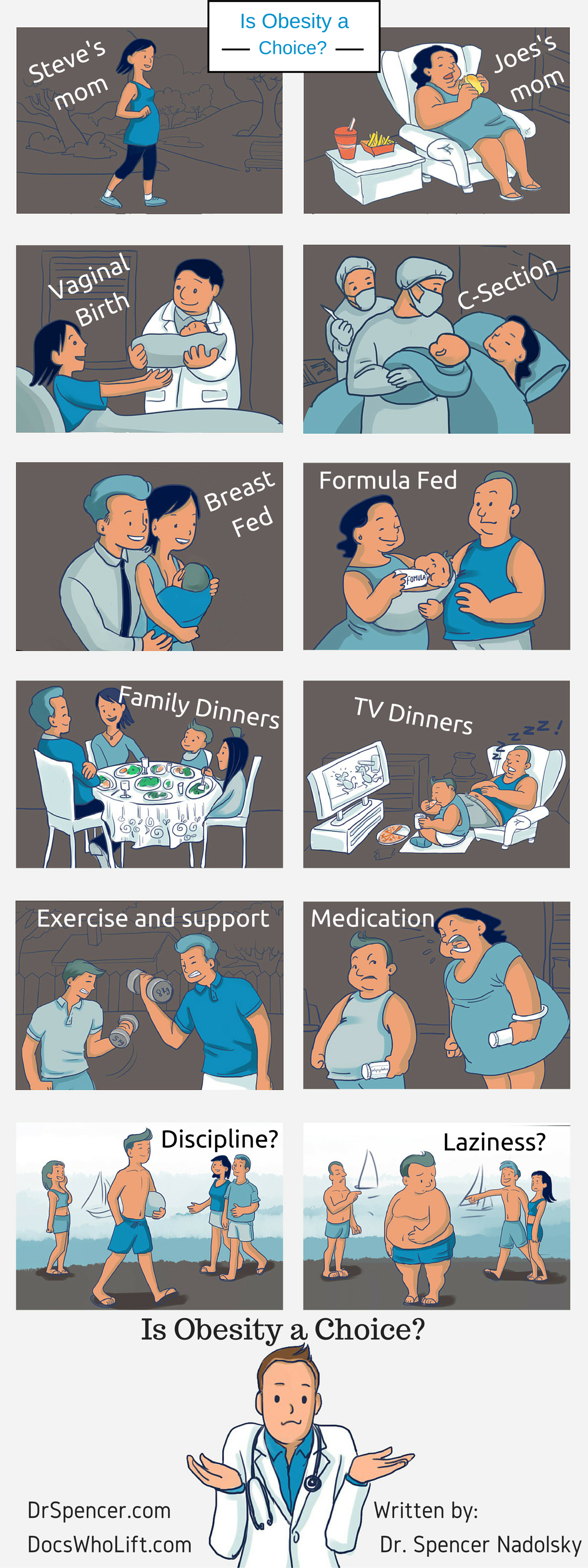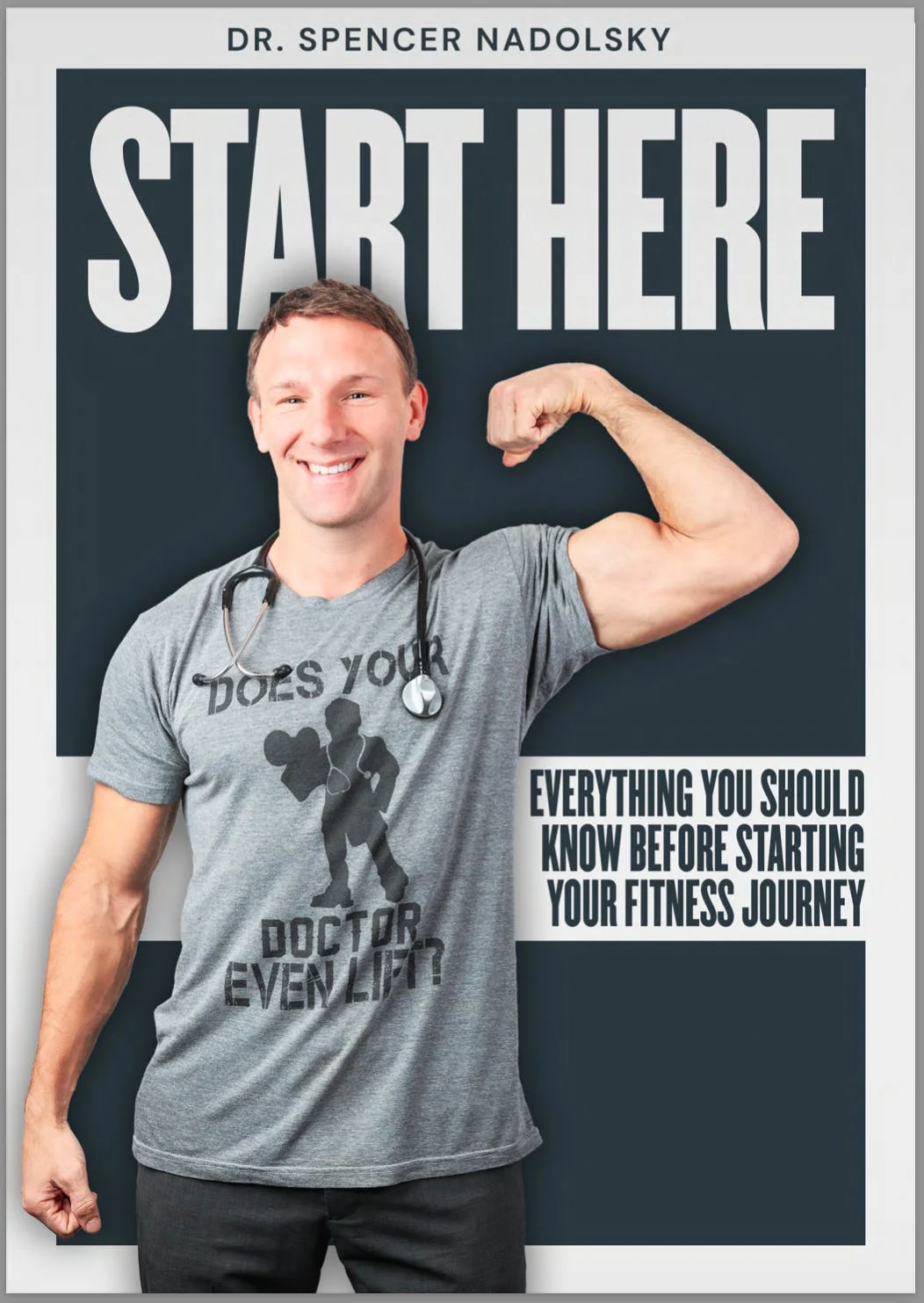Do you believe that obesity is due to laziness and a lack of will power? Do you think the solution is simply choosing to eat less and move more? Consider this story:

For many of you, this story may make sense. For others, this may frustrate you. The story of Steve and Joe is very common in the world. What we see at the end is a product of multiple factors throughout life. Let’s go over them to understand how complex obesity really is.
1. Epigenetics and Genetics
In utero (while in the womb), the impact of the mother’s lifestyle on the child’s life is much bigger than imagined. Not only is she passing on potential obesity related genes that influence behaviors and body composition, she is also influencing what are called epigenetics. There are studies showing mothers who gain an appropriate weight and live a healthy lifestyle versus a mother who does the opposite have a major impact (especially weight) on the child’s life. Look at the difference between Steve’s mom and Joe’s mom. Are these all the child’s/person’s choice?
2. Birth and Infancy
Even the child’s birth may have an impact. C-Sections are associated with obesity later in life. This may not be causal but could be an influence. This may not have been the choice of the mother (baby could be in distress) and does not make the mother a bad parent. Being breast fed versus formula fed can also change outcomes later in life. This may have been out of the hands of the mother because she couldn’t produce enough milk (could also be due to unwillingness of the mother). Are these the child’s/person’s choice?
3. Nurture
In childhood, forming healthy habits and maintaining a normal weight is important for health and leanness later in life. Developing a taste for mostly healthy foods instead of mostly hyperpalatable foods could be a major influence of this. Look at Steve’s family. They are eating a lot of vegetables and lean protein while enjoying each other’s company (likely eating slowly too). Poor Joe is left by himself eating mostly processed foods quickly in front of the tv. This isn’t to say that having fast food once in a while when younger will be the demise of everyone, but when that type of food predominates the diet, there may be trouble ahead. Exercising in youth is also important to stay lean and healthy. Look at Steve’s dad working out with him at a young age. Socioeconomical status may play a role in all of this. Maybe little Joe couldn’t go outside to play due to an unsafe neighborhood? Is this all the child’s/person’s choice?
4. Medical Conditions / Medicines
There are multiple medicines that cause weight gain. In this story, Joe was given powerful antipsychotics by a physician due to his “behavioral problems.” What if Joe were brought up in Steve’s family and given support and/or taught how to behave? These medicines have very powerful effects (including weight gain) that are extremely hard to overcome. Is this all the child’s/person’s choice?
5. Strong Physiologic/Biological Drivers
In the end, we see a lean Steve and an obese Joe. What many people see is simply hard work and discipline versus laziness and lack of willpower. What if I told you that once someone develops obesity, their hunger and food reward pathways change and their fat tissue starts secreting hormones that wreak havoc on your brain and body? What if it all came easier to Steve due to having the right parents and right upbringing and now normal physiology? What if I told you that when Joe saw the doctor and was told he was going to go to an early grave due to his obesity, he made multiple attempts to lose weight but couldn’t handle the hunger and low energy? In fact, he may have spent thousands of dollars on weight loss programs and supplements to help him, but was still unsuccessful. Is he still lazy? Is it all just willpower? Shouldn’t he just “white knuckle” his way through? Should he just try harder?
Now believe me, I am not saying Steve did not work hard. In fact he likely worked his butt off. But does this mean that Joe didn’t?
Does this mean Joe has no chance? I am NOT saying this at all. I am trying to paint the picture of why obesity is more complex than just eating less / moving move, having willpower, and being disciplined. It goes much deeper. I am saying that Joe needs more help than others. Writing him off as lazy is the worst thing you can do, especially if you are someone who works in healthcare (physicians, nurses, physical therapists, personal trainers, dietitians, etc). Help him. If he does not want help right now, then be there when he does.
Unfortunately, only a small percentage of people who try to lose weight are successful at keeping the weight off. Is it all due to lack of willpower and discipline or is it due to what I described above? Do we have an epidemic of laziness?
Maybe he needs medicine to help curb his intense hunger and cravings while he cuts his calories down and eat the right foods (these aren’t magical pills, they allow to follow a correct lifestyle). Maybe he needs a coach and support group to help with accountability and learning what foods to eat and how to cook? Maybe he eventually needs surgery to help? Maybe he just needs empathy and someone to turn to.
Yes. Joe DOES need to eat less and move more. But don’t you see it is MUCH more complex than just that?
Think I am just fit shaming? I am a lot like Steve. Of course I work extremely hard and always have in everything I do. I was privileged to have parents that took amazing care of me not only during youth but also in utero. I was brought up eating healthfully, but not with rigid dietary rules. We had pizza and fast food once in a while but it wasn’t the norm. My father and mother were both very well educated teachers. Sure we were only middle class, but I had everything I ever needed, including a lot of love and support. My father was also an amazing athlete as well as a wrestling coach and biology teacher. Nutrition and exercise were imprinted on me at a very young age because of this. I have worked extremely hard to get to where I am, but I had the opportunity to do so. Again, I am not discounting any of my achievements or adversity I have had to overcome.
See this video of my dad bringing me (7 years old at the time) and my brother (11 years old) to work out at the gym with him for proof.
I too used to think that obesity was due to sheer laziness. Now I realize that isn’t the case. I am telling this story so now you might think differently about the issue too. Even if you still disagree, I hope this opened your eyes to the complexity of obesity.
Also, before I get a bunch of angry hate mail from parents who had c-sections or fed their kids formula and fast food etc, I am not blaming you. Life happens. I totally understand. I am trying to make the point that not everything is in our own hands.
I will leave you with a quote I heard from Dr. Arya Sharma during an obesity conference I attended about 5 years ago:
“Telling someone with obesity to eat less is like telling someone with depression to cheer up.”
This story was inspired by my 7 years of studying obesity medicine and now being an obesity physician. It was also inspired by a cartoon I saw on privilege, which pretty much parallels this story.
Please share with others so the story doesn’t go untold.
To find an obesity physician who understands these complexities, go to abom.org and checkout their directory
